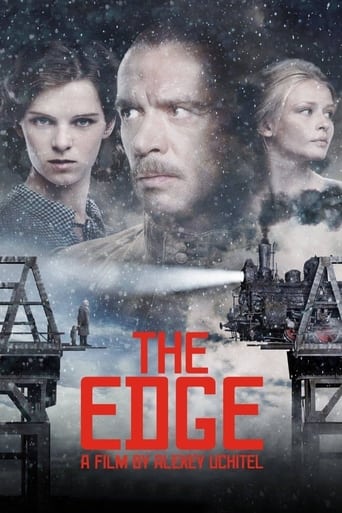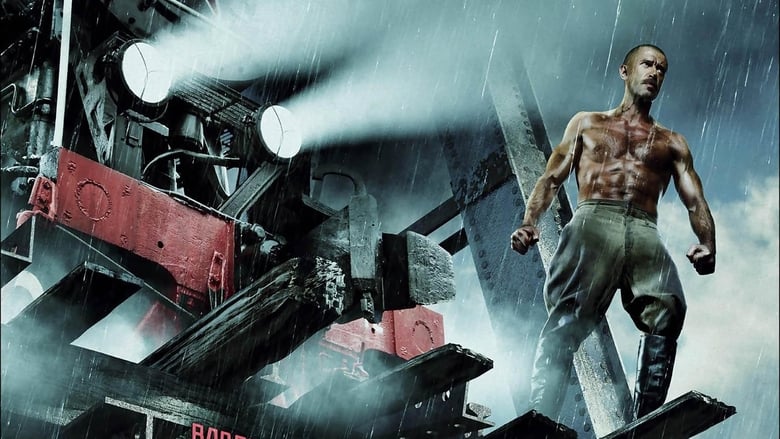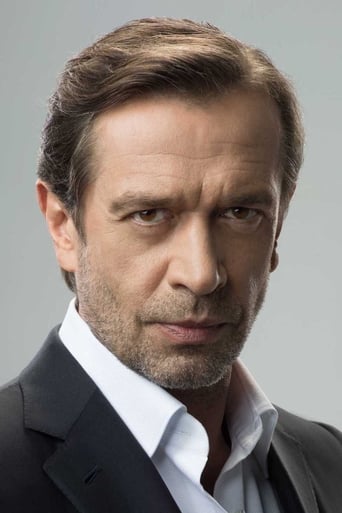

The Edge (2010)
The action takes place shortly after the end of the Second World War in the Siberian hinterland, among Russians and Germans with damaged personal stories and a strange transformation: the victors seem to be crawling into the skins of the defeated, and vice versa. Ignat, is the embodiment of the larger-than-life image of the Soviet victorious warrior who, in fact, proves to be shell-shocked, sick and broken, although not completely destroyed. Trains become fetish for the heroes of the film, and speed becomes a mania; they virtually become one with their steam engines, while the machines take on human names. The heroes set up an almost fatal race in the Siberian forest, risking their own lives and those of others.
Watch Trailer
Cast
Reviews
Truly Dreadful Film
Admirable film.
A movie that not only functions as a solid scarefest but a razor-sharp satire.
Blistering performances.
Even now I wonder what the film's motive really was. From the start, the protagonist doesn't really have a goal. He seems to be a drifter landing a job as a train driver, but then the film doesn't give the character a goal. He simply finds ways to overcome obstacles in his way as he moves along. Having said this, though, for a film with little to no goal set for the main character, it was surprisingly interesting. Almost the entire film is set on trains, and I really loved that! This film will be an absolute feast for train enthusiasts. Vladimir Mashkov lent a wonderful charm to hard-ass character Ignat. Vladimir was an excellent choice for this role. The rest of the cast was also very good, and the cinematography was also excellent.
Ignat is a Soviet veteran who arrives in a remote village to be responsible for the railway line. Treated as a war hero, it awakens the hatred and admiration of those who reside there, foreigners who have the "opportunity" to work for Mother Russia. Formerly a machinist, now he can not touch the locomotives because of his frequent convulsions. This fact is what awaken the first uncomfortable situation upon your arrival.Thus Ignat takes over the main locomotive, causing the silent fury of his former machinist - one of the strangers in the village. Motivated by this event, Elsa breaks with her boyfriend, the machinist, and seduces Ignat. When questioned, she responds that she needs a real man to take care of her and that Ignat has proved himself better in two situations about his former companion, which puts him as a stronger man.The climate in the village, more like a forced labor camp, gets worse. Ignat awakens fear as it imposes itself. By putting a locomotive in its maximum effort, it ends up damaging it and causing the locals to get injured - the fuse for Ignat to reach the end of the rails.These rails lead to a river and what was left of a bridge. Just as he finds an old abandoned powerful locomotive, because of the broken bridge. Ignat focuses on recovering the train and ends up meeting a savage savage who does not speak his language. The discovery of this girl causes discomfort in the village as Ignat tries to help her. Together they will face the challenge of trying to get the train to work, finding a way to reestablish the bridge and face the village's fury.The photography and the direction are okay, they fulfill their role and they hit on some good passages. The performances also follow this line, do not compromise and at one time or another crown with good performances. The script is original and approaches intelligently, it sins to be losing a bit in the middle of the story and almost recovers.Kray is a film that portrays a delicate moment in Russia, a time when locomotives were worth more than people and people were disposable or untouchable, without the middle ground. The war hero is put in check as a critique of exacerbated nationalism and the magic that surrounds Stalin's sympathizers. The Soviet lobotomy is cruel and imposing. Movie that ends up being interesting by its novelty, without sounding with strangeness.
I will not get into details about the movie itself - I like it a lot obviously. I will just try to answer some of the questions raised by some of the people that gave relatively low grade as they obviously did not understand a lot about the movie (probably due to bad subtitles or lack of enough attention) which I, being someone with good understanding in Russian and having quite good Bulgarian subtitles, have noticed: -This is not a Gulag! This is free labor camp - much different. People there are not imprisoned, are being cared about (clothed, fed relatively good and not harassed to death) while working for the state for something (wood harvesting and transporting I think). The idea is there the "spoiled" collaborationists to be reformed in the right attitude and habits for the "new" society.There is a train in the camp as this is the end of the railroad, this is the last station (hence the pun in the title "Kray" which in English means "End"). The locomotive is needed for keeping the railroad clean from snow during the winter and for transporting the harvested wood (second clearly seen in the movie and the first also explained in the film).The hitting is not without a reason, but it will take more than couple of lines to explain why for each case. Probably it is hard to understand for people that are not acquainted with the Russian/Soviet "Great Motherland war" (I am not sure if the translation is officially correct though) and the attitude of the whole nation towards the German invaders and the people who supported, helped or even tolerated them (especially men), especially from people who fought on the front."the main hero's girlfriend" is allowed separate room as she is the only one in the camp with a child - this is explicitly explained by her in the beginning of the movie and once again - this is not a Gulag! Please pay more attention before writing.About the train over the bridge - it is not something physically impossible. In fact the approach of rushing through an unstable construction instead of going slowly over it makes quite a sense - you pass through it in very short time before it has time to collapse and the inertia you have also helps. If you go slowly - you crush it under your weight.Overall, I believe that the atmosphere and the "flavor" of the time add the place is captured very well, and the characters are very realistic. I like Russian cinema a lot and probably being Bulgarian who grew during the socialist times and had to learn Russian since lower grades (now I don't regret this) helps me to understand and "feel"better their movies and what they are trying to say. So the movie for me is very, very good and kept me under it's impression for several days (still does). I highly recommend it, especially to people from Eastern Europe.I hope this review helps someone:)
Just after World War II, Ignat, a Soviet war hero, arrives at a Gulag camp in a remote section of Siberia, in order to try to handle a steam locomotive that is there. Soon he takes as his lover one of the prisoners, the pretty Sofia. Eventually, Ignat is told another locomotive is in an uninhabited forbidden island in a lake near the camp. When he goes to recover the locomotive, he finds a wild girl is living there, a German named Elsa who has been hiding there since the war started and the Russians killed her family (she is played by the pretty German actress Anjorka Strechel; unfortunately, it's hard to see her beauty in the movie since most of the time she is covered in dirt and dressed with shabby clothes). Ignat brings Elsa back to the camp in the broken locomotive, and soon sparks will fly between Elsa and Sofia for the love of Ignat. Since I love trains and snowy forests, I should have like this more, but it is hurt by very arbitrary plot points and a weak script. The train motif here seems a bit thrown in (why is there a train in the camp, anyway). I don't know if the portrayal of the Gulag camp is realistic, but in the movie it doesn't look as such a terrible place (when, in fact, hundreds of thousands of people if not millions die in the Gulag camps for otherwise treatable illnesses, malnutrition, exposure to the elements, etc.). Lots of Russian machismo in the movie as well, with the male characters hitting each other hard at the faintest of motives. The movie most memorable scene, that finally makes it worth watching, is a nude cat fight between Elsa and Sofia, with all the other naked woman in the camp watching.


